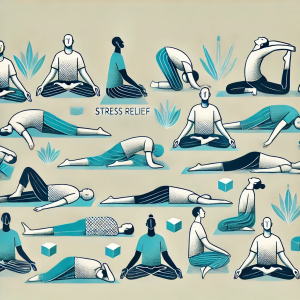By: Dr. Amanda Green, Stress Management Expert and Sexual Health Educator
In today’s fast-paced world, stress has become an inevitable part of life. However, incorporating yoga into your daily routine can significantly reduce stress levels and promote a sense of calm and well-being. Yoga offers a holistic approach to stress management by combining physical postures, breath control, and meditation. This article explores various yoga techniques that can help alleviate stress, providing insights into how you can integrate them into your life for improved mental and emotional health.

Understanding the Role of Yoga in Stress Relief
Yoga is a practice that harmonizes the mind, body, and spirit. It involves a series of physical postures (asanas), breath control (pranayama), and meditation techniques that work together to reduce stress and promote relaxation. By focusing on the present moment and creating a sense of mindfulness, yoga helps to calm the nervous system and reduce the production of stress hormones.

Key Yoga Techniques for Stress Relief
- Asanas (Physical Postures): Certain yoga postures are particularly effective in relieving stress and tension. These poses help to relax the body, stretch tight muscles, and promote a sense of well-being. Common stress-relieving asanas include:
- Child’s Pose (Balasana): This gentle resting pose calms the mind and relieves tension in the back, shoulders, and neck.
- Legs-Up-the-Wall Pose (Viparita Karani): This restorative pose helps to reduce anxiety, improve circulation, and promote relaxation.
- Cat-Cow Pose (Marjaryasana-Bitilasana): This gentle flow between two poses helps to relieve tension in the spine and promotes a sense of calm.
- Corpse Pose (Savasana): This ultimate relaxation pose allows the body to rest completely, reducing stress and promoting deep relaxation.
- Pranayama (Breath Control): Breath control techniques are a fundamental aspect of yoga for stress relief. By regulating the breath, you can influence the nervous system and reduce stress. Effective pranayama techniques include:
- Deep Belly Breathing: This technique involves taking slow, deep breaths into the belly, which activates the relaxation response and calms the mind.
- Alternate Nostril Breathing (Nadi Shodhana): This balancing breath technique helps to harmonize the left and right hemispheres of the brain, promoting a sense of calm and balance.
- Ujjayi Breath (Victorious Breath): This slow, rhythmic breath creates a soothing sound, helping to focus the mind and reduce stress.

- Meditation: Meditation is a powerful tool for stress management. It involves focusing the mind and eliminating distractions to achieve a state of deep relaxation and inner peace. Common meditation techniques for stress relief include:
- Mindfulness Meditation: This practice involves paying attention to the present moment without judgment. It helps to reduce stress by promoting awareness and acceptance.
- Guided Visualization: This technique involves visualizing a peaceful scene or setting to promote relaxation and reduce stress.
- Mantra Meditation: This involves repeating a calming word or phrase (mantra) to focus the mind and reduce stress.
- Relaxation Techniques: Incorporating relaxation techniques into your yoga practice can enhance its stress-relieving benefits. Effective relaxation techniques include:
- Progressive Muscle Relaxation: This involves tensing and then relaxing different muscle groups to release tension and promote relaxation.
- Body Scan: This meditation technique involves mentally scanning the body for areas of tension and consciously relaxing them.
- Yoga Nidra (Yogic Sleep): This guided meditation practice promotes deep relaxation and reduces stress by guiding you through a series of body awareness and breath techniques.

The Benefits of Yoga for Stress Relief
- Reduces Stress Hormones: Yoga helps to lower the levels of cortisol, the body’s primary stress hormone. This reduces the physiological effects of stress on the body.
- Promotes Relaxation: The combination of physical postures, breath control, and meditation in yoga activates the parasympathetic nervous system, promoting a state of calm and relaxation.
- Improves Mental Clarity: Yoga enhances mental clarity and concentration, helping to reduce mental clutter and improve focus.
- Supports Emotional Balance: Yoga encourages mindfulness and self-awareness, helping individuals to manage their emotions and cultivate a positive outlook.
- Enhances Physical Health: Regular yoga practice improves physical fitness, flexibility, and strength, contributing to overall well-being.

Incorporating Yoga for Stress Relief into Your Daily Routine
To fully benefit from yoga for stress relief, it is important to incorporate it into your daily routine. Here are some tips to get started:
- Create a Calm Space: Designate a quiet and peaceful area in your home for your yoga practice. This space can include a yoga mat, props (like blocks and straps), and items that inspire you, such as candles, crystals, and soothing music.
- Set a Regular Practice Time: Establish a consistent time each day for your yoga practice. Morning or evening sessions are ideal for setting a positive tone for the day or unwinding before sleep.
- Start with Simple Poses: Begin with simple and accessible poses, gradually progressing to more challenging asanas as your practice evolves. Focus on alignment and breath control in each pose.
- Include Breathwork: Incorporate pranayama exercises into your practice to enhance the flow of energy and calm the mind. Spend a few minutes on breath control techniques before or after your asana practice.
- End with Relaxation: Always conclude your practice with a relaxation pose, such as Savasana. This allows the body and mind to integrate the benefits of the practice and promotes a sense of peace and well-being.

The Role of a Yoga Teacher in Stress Relief
A knowledgeable and experienced yoga teacher can greatly enhance your stress-relief practice. They can provide guidance on proper alignment, offer personalized modifications, and support your emotional and mental well-being. Consider joining a yoga class focused on relaxation and stress management or seeking private instruction to deepen your understanding and experience of the practice.

Combining Yoga with Other Stress-Relief Practices
Yoga can be seamlessly integrated with other stress-relief practices to enhance its benefits:
- Mindfulness Meditation: Combining yoga with mindfulness meditation can deepen your relaxation and promote greater mental clarity and emotional balance.
- Aromatherapy: Using essential oils such as lavender, chamomile, or eucalyptus during your yoga practice can enhance relaxation and reduce stress.
- Massage Therapy: Regular massage therapy can complement your yoga practice by relieving muscle tension and promoting relaxation.
- Healthy Nutrition: Following a balanced and nutritious diet can support your yoga practice and overall well-being, helping to reduce stress levels.

Conclusion
Yoga is a powerful tool for stress relief, offering a holistic approach to managing stress and promoting relaxation. By incorporating yoga into your daily routine, you can experience the transformative benefits of this ancient practice, including reduced stress levels, improved mental clarity, emotional balance, and enhanced overall well-being. Whether you are a beginner or an experienced practitioner, yoga provides a pathway to calm the mind and body, fostering a sense of peace and harmony in your life.
Dr. Amanda Green is an expert in stress management and sexual health education, holding a Ph.D. in Psychology. She has dedicated her career to helping individuals manage stress to improve their overall well-being and intimate relationships. Dr. Green offers workshops and private consultations that teach mindfulness and relaxation techniques specifically designed to reduce stress and enhance sexual intimacy.


